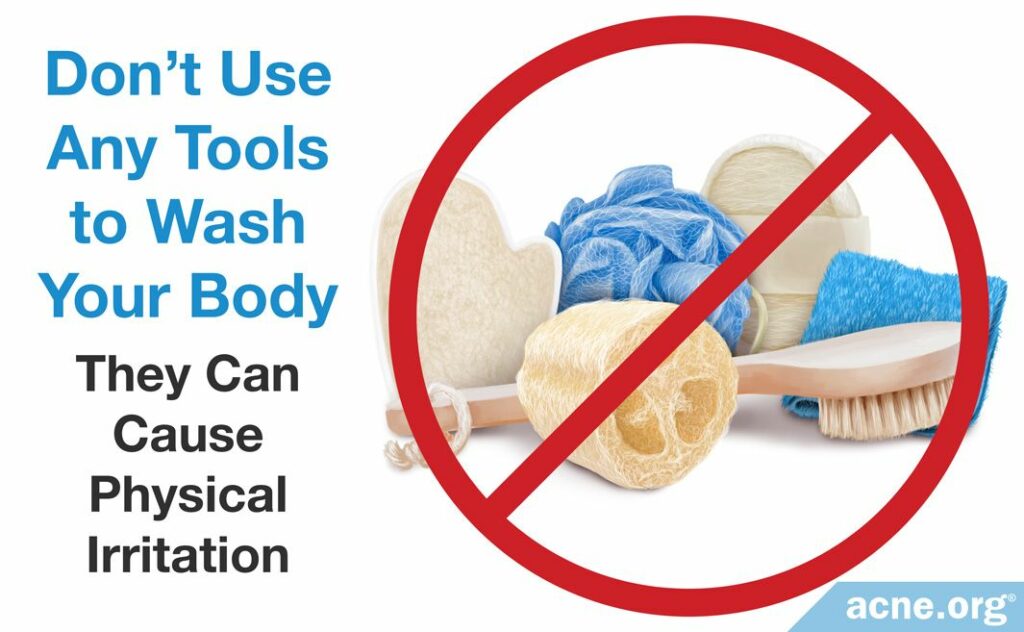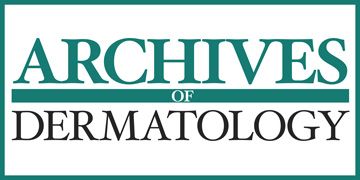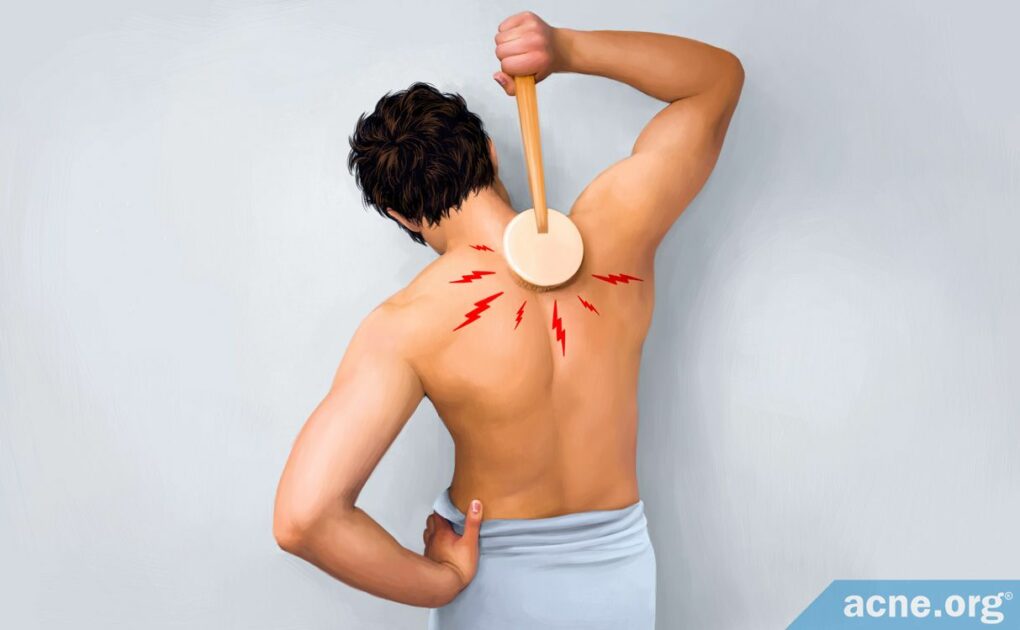Scrubbing Your Body Can Lead to More Body Acne. Use Only Your Bare Hands and Gently Wash Each Part of Your Body For Only A Few Seconds.

The Essential Info
It is so well known that harshly scrubbing the skin of the face or body can lead to acne that it has an official medical term: acne mechanica.
The “mechanica” part of that term stands for anything that physically, or “mechanically,” irritates the skin. Washing the skin too harshly, especially with scrubbing tools like washcloths, loofahs, or exfoliating sponges or gloves, is an example of acne mechanica in real life and can lead to more body acne.
To reduce the chance of experiencing more body acne due to acne mechanica, use only your bare hands when washing the body, and stay gentle.
Choosing a Cleanser: It’s important to use a mild, non-overdrying cleanser. Never use soap. A good way to find a cleanser that will not be irritating is to use a cleanser made specifically for the face when cleansing your body. Facial cleansers, especially cleansers that specifically state that they are “ultra-gentle” or “for sensitive skin” on the label tend to be safer for acne-prone skin.

The Science
- The Right Way to Wash
- Products to Avoid
- Using A Proper Cleanser Is Also Important
- Last Bit of Advice: Do Not Over-wash the Skin
- More About Acne Mechanica
- Conclusion
People with acne often wrongly believe that aggressively washing or scrubbing the skin will help improve their acne. The opposite is actually true. Staying gentle is best.
Dermatologists and scientists know that anything that physically irritates the skin by causing too much friction, tension, rubbing, or pressure to the skin, especially for an extended period of time, can cause acne. In fact, it is such a well known fact that it has its own medical term: acne mechanica.

Harshly scrubbing the skin of the body while washing in the shower is an example of unnecessary physical irritation, particularly when exfoliating tools like these are used:
- Washcloths
- Natural and synthetic loofah scrubbers, sponges, and pads
- Bath mitts
- Men’s shower tools
- Exfoliating towels
The Right Way to Wash
Avoid any and all tools. Instead, lather up only your bare hands using a gentle cleanser. Then, using gentle circular motions, wash each part of your body for only a few seconds and move on.
Products to Avoid
When it comes to washing your body, throw out any tools you currently use and switch to using only your bare hands.
The most commonly used products that should be avoided for anyone with acne-prone skin on the body include:
- Washcloths
- Natural loofah scrubbers
- Synthetic loofah sponges
- Loofa pads
- Bath mitts
All of these products cause far more physical irritation to the skin of the body than your bare hands.
Using A Proper Cleanser Is Also Important
For acne-prone skin, it is important to cause the least irritation possible when cleansing, and studies show us that soap is irritating and gentle cleansers are preferred.
Soap: Avoid
Soaps are made with harsh chemicals and oils that can damage the fragile skin barrier, leading to clogged pores and acne.
You can spot a soap by checking to see if it has ingredients like these. Notice that they all start with either “sodium,” “potassium,” or “triethanolamine” and end in “-ate.”
- Sodium talowate
- Sodium cocoate
- Sodium palmitate
- Sodium palm kernelate
- Potassium olivate
- Potassium castorate
- Triethanolamine sterate
Choose a mild liquid or bar cleanser instead
The easiest way to choose a safe liquid or bar cleanser is to choose one made specifically for the face. Be sure to look for terms like “mild,” “gentle,” “ultra-gentle,” or “for sensitive skin.”
Also avoid any cleanser that contains the ingredient sodium lauryl sulfate (SLS). It is the harshest cleansing ingredient used in cleansers. While some cleansers do contain SLS in very small amounts, and are thus not overly irritating, it is simplest and safest to simply avoid this ingredient.
Mild facial cleansers may also sometimes contain various extracts, moisturizing ingredients, or skin-calming ingredients, and normally these ingredients cause little to no irritation and can even sometimes prove beneficial. So don’t worry too much about these extra ingredients. Most importantly, choose a mild cleanser made for sensitive facial skin.
Last Bit of Advice: Do Not Over-wash the Skin
Another common belief is that washing the skin multiple times a day will help improve acne. Again, the opposite is true. Over-washing the skin will irritate the skin. Try to wash the skin no more than two times a day when you can. And on the occasions when you go swimming, or for any other reason have to wash multiple times, apply a moisturizer afterward if your skin feels dry.
More About Acne Mechanica
Acne mechanica is acne that has been caused by physical irritation, friction, tension, rubbing or pressure. It can develop:
- On the face: From frequently touching the face, washing too roughly, or wearing helmets, facemasks, tight hairbands, hats
- On the neck: From the rubbing of tight or stiff shirt collars, turtlenecks, or musical instruments like the violin/fiddle
- On the shoulders: From backpack straps, purse straps, or pressure due to sports equipment like football pads
- On the back: The back is an area that is almost always in contact with something. Don’t get too worried about everything that is touching your back. When it comes to your back, just be sure to eliminate any obvious sources of irritation when you can.
This is of course not an exhaustive list because there are an unlimited number of things that can potentially physically irritate your skin. Even a massage can sometimes cause acne mechanica if you don’t take precautions to treat your skin after the massage.
The history of acne mechanica

Two scientists, Mills and Kligman, first described acne mechanica in 1975 in a study published in the Archives of Dermatology. The scientists applied a 2-inch piece of adhesive tape to the skin of the shoulder blades of 10 volunteers with facial and back acne. After one week, the irritating tape was removed to see if acne had increased, and then reapplied for another week. The researchers found that the tape-covered area experienced an increase in the amount of acne. After two weeks, the researchers found that the tape also induced inflammation in the hair follicle and in the acne lesion. This showed that irritation and pressure, especially when it is prolonged, can worsen acne.1
Conclusion
Physically irritating the skin can lead to the development of more body acne. When washing the body, it is important to use only your bare hands, and wash gently with a mild cleanser, preferably no more than two times per day.
References
- Mills, O. & Kligman, A. Acne mechanica. Archives of Dermatology 111, 481-483 (1975). https://www.ncbi.nlm.nih.gov/pubmed/123732
- Friedman, M. & Wolf, R. Chemistry of Soaps and Detergents: Various Types of Commercial Products and Their Ingredients, Clinics in Dermatology, 14, 7-13 (1996). https://www.ncbi.nlm.nih.gov/pubmed/8901393
 Acne.org Products
Acne.org Products